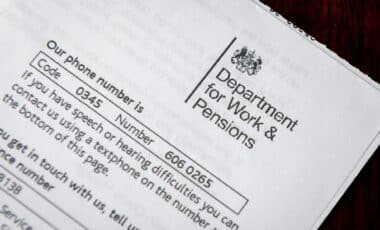The Department for Work and Pensions (DWP) has unveiled new measures to tackle fraudulent claims within the Personal Independence Payment (PIP) system. Following a significant loss of £90 million due to fraud and error in the 2023/24 financial year, these changes aim to safeguard the system and reduce incorrect payments.
According to Daily Record, the DWP is taking a proactive approach to address these issues, introducing stricter checks and enhanced verification processes. With ongoing efforts to recover lost funds, these new strategies are designed to ensure that benefits reach those who genuinely need them.
Tackling Fraud and Error in the Benefits System
The DWP has reaffirmed its commitment to tackling fraud and error within the benefits system, with a particular focus on the recovery of debts generated by Personal Independent Payments (PIP).
These efforts come after concerns were raised by Conservative MP Sir John Hayes about fraudulent claims within the system. Minister for the DWP, Andrew Western, outlined several new measures in response to these concerns.
Mr. Western emphasized that the department is
Committed to tackling fraud and error in the benefits system and to the recovery of debts, including those generated by Personal Independent Payments.
He added that the DWP is “working closely with counter fraud experts” and has introduced several measures to
Prevent fraud entering the system based on the types of cases and trends we have seen.
One significant change is the introduction of more rigorous checks for customers who update their personal details, including bank accounts.
Strengthening Fraud Prevention Protocols
The DWP’s newly introduced measures aim to enhance fraud prevention within the system. One of the key steps includes strengthening the identity and verification process, designed to prevent fraudulent claims before they enter the system by improving identity verification protocols.
The DWP is also implementing more rigorous checks for personal detail changes, carefully scrutinizing any updates to personal information, including bank account details, to avoid fraudulent claims.
Additionally, awareness sessions for case managers and healthcare professionals will be held to help staff identify and respond to suspicious claims, such as those involving fake documents.
Furthermore, the DWP is increasing its investment in counter-fraud professionals and building stronger data analysis capabilities to better detect and address fraud.
Delivering against key counter fraud activity, including investing in counter fraud professionals and building data analytical capabilities.
The Fraud, Error, and Debt Bill is a key part of the new efforts. Mr. Western noted that the Government will be legislating these measures soon, and details of the legislative changes will be presented to Parliament in due course.
The Impact of Fraud and Error
In addition to the £90 million lost in the PIP system last year, fraud and error in the broader welfare system are estimated to cost taxpayers nearly £10 billion annually. Since the onset of the pandemic, around £35 billion has been incorrectly paid to individuals not entitled to receive benefits.
This figure includes fraudulent claims made by criminal organizations, not just individual benefit claimants. The DWP distinguishes between three categories of error: Fraud occurs when a claimant intentionally provides false information, resulting in an improper benefit payment.
Claimant Error arises when a claimant offers inaccurate or incomplete information, or fails to report a change in their circumstances, leading to overpayments. Official Error refers to mistakes made by the DWP or other relevant authorities, such as delays, incorrect assessments, or failures to act appropriately.
The Proposed Fraud, Error, and Debt Bill
The government is also introducing the Fraud, Error, and Debt Bill, which is expected to bring forward new measures to tackle fraud within the benefits system. As part of these new legislative changes, the DWP will not have direct access to claimants’ bank accounts or personal spending data.
However, financial institutions will be required to share limited information with the DWP to help verify benefit eligibility, particularly where there may be conflicts with eligibility rules, such as the £16,000 capital limit in Universal Credit.
Mr. Western clarified that the bill
Will not give DWP access to any bank accounts, nor any information on how claimants spend their money,
adding that banks and financial institutions will only share “limited information” to assist in verifying eligibility. This data sharing is primarily intended to help flag potential conflicts with the eligibility rules, such as identifying whether claimants are exceeding asset limits.
The Minister also explained that the Eligibility Verification Measure (EVM), as part of the bill, would help the DWP detect incorrect payments, prevent debts from accruing for claimants, and identify possible fraudulent activity.
As set out by the National Audit Office, access to data is key to prevention and detection of incorrect payments – he added.
Despite concerns about privacy, the Minister emphasized that the legislation would include key safeguards, including reporting mechanisms and independent oversight. No benefit entitlement decision will be made solely because of the data obtained under EVM; instead, a final decision will always involve a human agent.
If a claimant wishes to challenge or appeal a benefit decision, they can do so following the DWP’s appeals processes – said Mr. Western.









